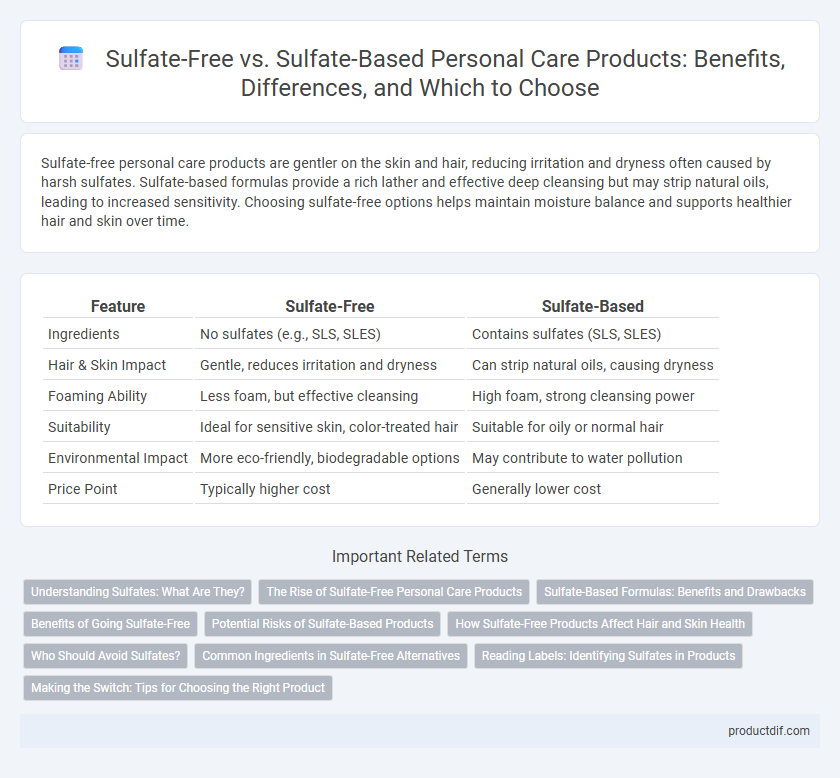Sulfate-free personal care products are gentler on the skin and hair, reducing irritation and dryness often caused by harsh sulfates. Sulfate-based formulas provide a rich lather and effective deep cleansing but may strip natural oils, leading to increased sensitivity. Choosing sulfate-free options helps maintain moisture balance and supports healthier hair and skin over time.
Table of Comparison
| Feature | Sulfate-Free | Sulfate-Based |
|---|---|---|
| Ingredients | No sulfates (e.g., SLS, SLES) | Contains sulfates (SLS, SLES) |
| Hair & Skin Impact | Gentle, reduces irritation and dryness | Can strip natural oils, causing dryness |
| Foaming Ability | Less foam, but effective cleansing | High foam, strong cleansing power |
| Suitability | Ideal for sensitive skin, color-treated hair | Suitable for oily or normal hair |
| Environmental Impact | More eco-friendly, biodegradable options | May contribute to water pollution |
| Price Point | Typically higher cost | Generally lower cost |
Understanding Sulfates: What Are They?
Sulfates are surfactants commonly found in personal care products like shampoos and body washes, used to create a rich lather and remove oils and dirt from the skin and hair. Sulfate-free products utilize alternative cleansing agents that are often milder and less likely to cause irritation or dryness, making them suitable for sensitive skin and color-treated hair. Understanding the chemical composition and effects of sulfates helps consumers make informed choices based on their specific hair and skin care needs.
The Rise of Sulfate-Free Personal Care Products
Sulfate-free personal care products have gained significant traction due to increased consumer awareness of skin sensitivity and environmental concerns. These products avoid harsh surfactants like sodium lauryl sulfate (SLS), reducing irritation and preserving natural oils in hair and skin. Market trends reveal a growing preference for gentle formulations, driving major brands to expand sulfate-free lines globally.
Sulfate-Based Formulas: Benefits and Drawbacks
Sulfate-based formulas in personal care products offer powerful cleansing properties that effectively remove dirt, oil, and buildup, making them ideal for deep cleaning. They create rich, foamy lathers that enhance the user experience while providing cost-effective solutions for manufacturers. However, these formulas can strip natural oils, potentially causing dryness and irritation, especially for sensitive skin or color-treated hair.
Benefits of Going Sulfate-Free
Sulfate-free personal care products gently cleanse the skin and hair without stripping natural oils, reducing dryness and irritation often caused by sulfate-based formulas. They are ideal for sensitive skin, color-treated hair, and maintaining moisture balance, promoting healthier and shinier hair. Choosing sulfate-free options also minimizes scalp inflammation and prevents damage to the hair cuticle, enhancing overall hair and skin health.
Potential Risks of Sulfate-Based Products
Sulfate-based personal care products often contain sodium lauryl sulfate (SLS) or sodium laureth sulfate (SLES), which can strip natural oils from the skin and hair, leading to dryness and irritation. Prolonged use may exacerbate sensitive skin conditions like eczema or cause scalp inflammation. Users seeking gentle cleansing are increasingly turning to sulfate-free alternatives to minimize these potential risks.
How Sulfate-Free Products Affect Hair and Skin Health
Sulfate-free personal care products minimize irritation and dryness by avoiding harsh detergents such as sodium lauryl sulfate, which can strip natural oils from hair and skin. These products help maintain the scalp's natural moisture balance, reducing inflammation and promoting healthier hair growth while preserving skin's protective barrier. Consumers with sensitive skin or color-treated hair benefit from sulfate-free formulations as they support hydration and reduce the risk of irritation or fading.
Who Should Avoid Sulfates?
Individuals with sensitive skin, eczema, or psoriasis should avoid sulfate-based personal care products due to their potential to cause irritation and dryness. People with color-treated or chemically processed hair benefit from sulfate-free shampoos, as sulfates can strip natural oils and fade color faster. Those seeking gentle cleansing agents often prefer sulfate-free options to maintain moisture balance and reduce scalp inflammation.
Common Ingredients in Sulfate-Free Alternatives
Sulfate-free personal care products commonly feature mild cleansing agents such as cocamidopropyl betaine, sodium lauroyl methyl isethionate, and decyl glucoside, which effectively clean without stripping natural oils. Ingredients like aloe vera, glycerin, and panthenol are often included to enhance hydration and soothe sensitive skin. These formulations avoid harsh sulfates like sodium lauryl sulfate (SLS) or sodium laureth sulfate (SLES), reducing irritation and maintaining moisture balance in hair and skin.
Reading Labels: Identifying Sulfates in Products
Reading labels to identify sulfates in personal care products involves looking for ingredients such as sodium lauryl sulfate (SLS) and sodium laureth sulfate (SLES), which are common sulfate-based surfactants known for their strong cleansing properties but potential skin irritation. Sulfate-free products replace these with milder alternatives like coco-glucoside or sodium cocoyl isethionate, reducing the risk of dryness and sensitivity. Understanding ingredient lists helps consumers choose formulations that align with their skin type and personal care goals.
Making the Switch: Tips for Choosing the Right Product
Choosing sulfate-free personal care products reduces scalp irritation and preserves natural oils, ideal for sensitive skin and color-treated hair. When making the switch, examine ingredient labels for gentle alternatives like cocamidopropyl betaine and glycosides to maintain cleansing efficacy without harsh sulfates. Transition gradually by alternating sulfate-free and sulfate-based products to allow hair and scalp adjustment, minimizing dryness or buildup.
sulfate-free vs sulfate-based Infographic

 productdif.com
productdif.com